Related Research Articles
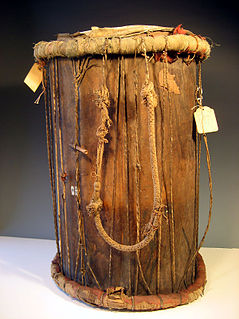
Senegal's music is best known abroad due to the popularity of mbalax, a development of Serer conservative njuup music and sabar drumming popularized internationally by Youssou N'Dour.
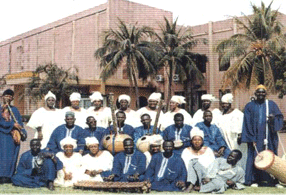
The Music of Mali is, like that of most African nations, ethnically diverse, but one influence predominates; that of the ancient Mali Empire of the Mandinka. Mande people make up 50% of the country's population, other ethnic groups include the Fula (17%), Gur-speakers 12%, Songhai people (6%), Tuareg and Moors (10%) and another 5%, including Europeans. Mali is divided into eight regions; Gao, Kayes, Koulikoro, Mopti, Ségou, Sikasso, Tombouctou and Bamako.
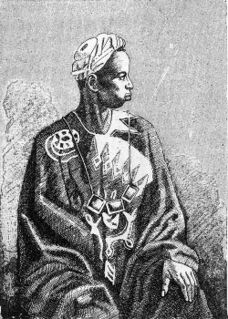
A griot is a West African historian, storyteller, praise singer, poet, or musician. The griot is a repository of oral tradition and is often seen as a leader due to their position as an advisor to royal personages. As a result of the former of these two functions, they are sometimes called a bard.
Afel Bocoum is a musician from Mali, noted as a singer and guitarist. He began his career as a member of Ali Farka Touré's group ASCO, and Toure is often regarded as his mentor. Both men come from the town of Niafunke on the River Niger, and are members of the Sonrai people. Bocoum is an agricultural advisor by profession.
Pioneer Jazz was a Malian band from the 1960s. The band emerged from the city of Bamako after Modibo Keita, the Malian leader, began subsidizing musical groups as long as they used indigenous praise song, and the kora and balafon musical instruments, in their music. Pioneer Jazz became very popular, and contributed musicians who went on to join other renowned Malian bands. Perhaps the most prominent member of Pioneer Jazz was guitarist Djelimady Tounkara, who later joined the Rail Band.
The Rail Band is a Malian band formed in 1970; it was later known as Super Rail Band, Bamako Rail Band or, most comprehensively and formally, Super Rail Band of the Buffet Hotel de la Gare, Bamako. Its fame was built upon the mid-20th century craze for Latin — especially Cuban — jazz music which came out of Congo in the 1940s. The Rail Band was one of the first West African acts to combine this mature Afro-Latin sound with traditional instruments and styles. In their case, this was built upon the Mande Griot praise singer tradition, along with Bambara and other Malian and Guinean musical traditions. Their distinctive sound came from combining electric guitar and jazz horns with soaring Mandinka and Bamabara lyrical lines, African and western drums, and local instruments such as the kora and the balafon. At their height of fame in the 1970s, the Rail Band played to sold-out venues and even stadia across West Africa, and launched solo careers for many of its members, including the legendary vocalist Salif Keita.
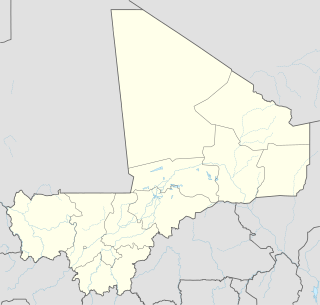
Kita is a town and urban commune in western Mali. The town is the capital of the Kita Cercle in the Kayes Region. It lies on the eastern slope of Mount Kita, known for its caves and rock paintings. Today, the town is known for its music, its annual Roman Catholic pilgrimage and its role as a processing center for the surrounding cotton- and peanut-growing region. Kita lies on the Dakar-Niger Railway and is the largest transit hub between Bamako and Kayes. In the 2009 census the urban commune had a population of 48,947.

Toumani Diabaté is a Malian kora player. In addition to performing the traditional music of Mali, he has also been involved in cross-cultural collaborations with flamenco, blues, jazz, and other international styles.

Rokia Traoré is a Malian-born singer, songwriter and guitarist.

Habib Koité is a Malian musician, singer, songwriter and griot based in Mali. His band, Bamada, was a supergroup of West African musicians, which included Kélétigui Diabaté on balafon.

Boureima "Vieux" Farka Touré (1981) is a Malian singer and guitarist. He is the son of Grammy-winning Malian musician Ali Farka Touré.

Articles related to Mali include:

Mamadou Diabaté is a Malian musician known for his work with the kora. He began playing quite early in his life, became known as a musician in the area of Mali in which he lived, and has since moved to the United States, recording several albums.

Cheick Hamala Diabate is a musician from Mali, West Africa, who has been nominated for a Grammy award. Using Adelphi, Maryland, as his home he travels all over the United States, Canada, Europe, and Asia. He has performed at the Kennedy Center, the United States Senate, and the Smithsonian Institution. Cheick Hamala was born into a griot family in Kita, Mali. From a young age, he learned to play the ngoni, a stringed instrument related to the American banjo. In addition, Cheick has learned the history of Mali passed down for over 800 years. Cheick has performed internationally.

Ali Ibrahim "Ali Farka" Touré was a Malian singer and multi-instrumentalist, and one of the African continent's most internationally renowned musicians. His music blends traditional Malian music and its derivative, North American blues and is considered a pioneer of African desert blues. Touré was ranked number 76 on Rolling Stone's list of "The 100 Greatest Guitarists of All Time" and number 37 on Spin magazine's "100 Greatest Guitarists of All Time".
Mamadou Sidiki Diabaté is a prominent Mandé kora player and jeli from Bamako, Mali. He is the 71st generation of kora players in his family and a son to Sidiki Diabaté.
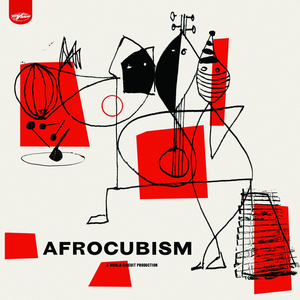
AfroCubism is a Grammy-nominated album featuring musical collaborations between musicians from Mali and Cuba. It was released in 2010.
Kélétigui Diabaté was a Malian musician, described as an "undisputed master" of the balafon, and as "one of the greatest figures in Malian contemporary music".

Red Earth is a 2007 studio album by Dee Dee Bridgewater. It carries the subtitle "A Malian Journey" to celebrate and explore her African and Malian ancestry. The album brought her the seventh nomination for Best Jazz Vocal Album at the 2008 Grammy Awards. On Billboard's Top Jazz Album chart it reached Number 16.
References
- ↑ Fletcher, James (23 November 2010). "Second chance for Africa's Buena Vista Social Club". BBC News. Retrieved 14 July 2018.
- ↑ BBC 3 Awards for World Music